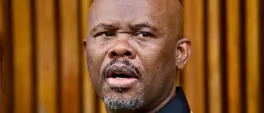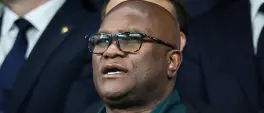LUCIAN DAVIDS: The ANC must be clear – socialism or neoliberalism?
Lucian Davids
17 September 2024 | 10:52The people of South Africa need more than social democracy; they need socialism, to secure access to the basic necessities of life. But over many years, the ANC has found itself ensnared within a neoliberal framework that has restricted its capacity to address the welfare requirements of the working class and the underprivileged, writes Lucian Davids.
The ideological struggle between the South African Communist Party (SACP) and the African National Congress (ANC) has reached a critical juncture, driven by capital through the establishment of the Government of National Unity (GNU).
Within this era of "democratic breakthrough," the ANC has embraced a position shared by numerous other African countries that have gone through liberation movements.
A recurring pattern in these movements is that, after the fight for liberation, during negotiations, they find themselves ensnared in an "economic trusteeship" controlled by their former oppressors.
This arrangement mirrors the relationship between France and its former colonies in West Africa, especially with the Economic Community of West African States (ECOWAS), where political power was yielded. In contrast, economic power remained firmly in the hands of the former colonisers.
In South Africa, the debate surrounding the direction of the ANC is by no means new. It echoes the warnings of our late General Secretary, Comrade Chris Hani, who opposed the negotiations that signified the country's transition to democracy.
The current sentiments expressed by General Secretary, Comrade Solly Mapaila, mirror a similar tension that existed in the 1990s, just before the democratic elections. The suggestion that the ANC should sever its ties with the SACP to ensure its own survival is inherently concerning.
Such a stance disregards the fundamental truth that the revolution did not conclude with the abolition of apartheid; on the contrary, it must intensify during this stage.
One of the most significant barriers to national unity and State-building is the persistent "coloniality" — the remnants of colonial and apartheid structures that continue to shape our society.
The Democratic Alliance (DA), currently governing the Western Cape, epitomises these remnants. The DA represents imperialism and apartheid in their most unadulterated form, and the disparities between the wealthy and the poor are nowhere starker than in the Western Cape.
Under DA rule, the income gap continues to widen, which clearly reflects their adherence to neoliberal policies. Consequently, forming a government with the DA would undeniably be counter-revolutionary.
If the ANC wishes to remain true to its historical mandate, it must not entertain such an alliance.
Mapaila has appropriately highlighted the emergence of capitalist forces contending in the 2024 elections. These forces have launched a comprehensive campaign, providing funds to political parties such as the Multi-Party Charter (MPC), commonly known as the "Moonshot Pact".
This pact endorses free-market policies in its manifesto and has benefited from a well-coordinated media campaign aimed at discrediting the ANC. However, while this offensive from capital played a role in the ANC's loss of support, it is by no means the sole cause.
The ANC's adoption of a "pragmatic" macroeconomic policy has significantly contributed to the current political and economic crisis.
At the core of this shift is the Growth, Employment and Redistribution (GEAR) policy, which has had devastating consequences for the ANC and the country.
GEAR was presented as an extension of the Reconstruction and Development Programme (RDP), but in practice, it represented a significant departure from the RDP's transformative vision. One of GEAR's main pillars was the privatisation of state-owned enterprises (SOEs).
Telkom was among the initial casualties of this policy, and presently, Eskom is being unbundled under the pretext of dysfunctionality. These actions are nothing more than neoliberal strategies disguised as necessary reforms.
Moreover, the unbundling of Eskom is a delayed action proposed in the early 2000s through a policy framework titled "An accelerated agenda towards restructuring SOEs".
In conjunction with privatisation, austerity measures and budget cuts implemented under the guise of maintaining a "healthy fiscus" have further entrenched inequality and poverty in the country.
The structural adjustments introduced by GEAR have contributed to the rapid decline in electoral support for the ANC.
In 2004, the ANC held 69.7% of the vote, a figure that has since plummeted to 40.2% in 2024.
The SACP and COSATU opposed GEAR from the beginning, recognising its inherent contradictions and the harm it would cause to the working class. However, much like the GNU, GEAR was imposed without adequate discussion or input from alliance partners.
The policy was presented as a fait accompli, accepted by the ANC, and implemented as a common programme.
In light of this, the recent comments by ANC Secretary General, Comrade Fikile Mbalula, are deeply concerning.
Mbalula said the ANC is not advancing socialism and can, at best, be regarded as a "social democratic" organisation.
This statement implies that the ANC has no intention of progressing beyond a certain phase of historical development. For the SACP, this signals the ANC has effectively abandoned the struggle for socialism and is content to remain within the bounds of social democracy.
However, social democracy is not an achievement. It is a platform that continues to allow the bourgeoisie to exploit the working class, maintaining the capitalist system under the guise of progressive reforms.
The people of South Africa need more than social democracy; they need socialism. As Hani emphasised, socialism is about securing access to the basic necessities of life: safe drinking water, food security, housing, and quality education.
These are not luxuries; they are fundamental rights that should be guaranteed to all citizens. In a society as unequal as South Africa, these rights must be regarded as non-negotiable.
The SACP must, therefore, maintain a resolute commitment to socialism and endeavour to overcome the limitations imposed by the ANC.
Over the course of many years, the ANC has found itself ensnared within a neoliberal framework that has restricted its capacity to address the welfare requirements of the working class and the underprivileged.
The time has now arrived for the SACP to transcend these limitations and forge a new path towards socialism.
If the ANC persists in embracing neoliberal policies, disguised as social democracy, it will only exacerbate the socio-economic crises confronting the nation.
It is imperative for the working class to be mobilised, demanding a departure from this flawed model and advocating for a future characterised by socialism, in which their rights and dignity are upheld.
South Africa finds itself at a crucial juncture, faced with a clear choice: neoliberalism or socialism. The present trajectory of the ANC, under the guise of social democracy, will only perpetuate the existing disparities and injustices that afflict our society.
The SACP must rise to the occasion, rejecting the neoliberal agenda and guiding the country towards a socialist future.
Only then can we realise the promise of the revolution and establish a society in which power rests with the people, rather than capital.
Lucian Davids is a national committee member of the Young Communist League of South Africa.
Trending News
More in Opinion

10 October 2025 17:39
MALAIKA MAHLATSI | The rise of political celebrities and the appeal of the lowest common denominator

10 October 2025 12:43
CHRIS OXTOBY & JUDITH FEBRUARY | JSC interviews – hope and questions

8 October 2025 08:56
CHARLES MATSEKE | Mogotsi vs Mbalula: ANC mutually assured distraction














